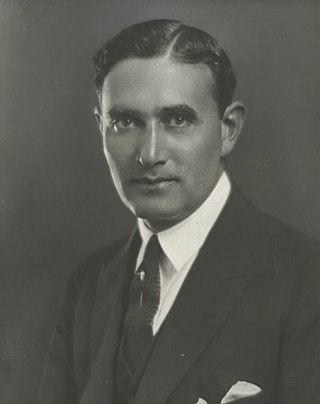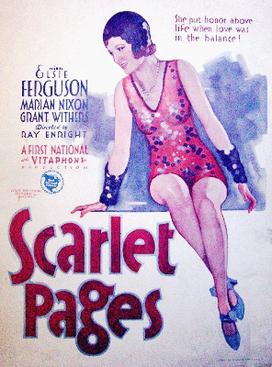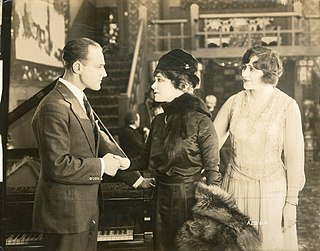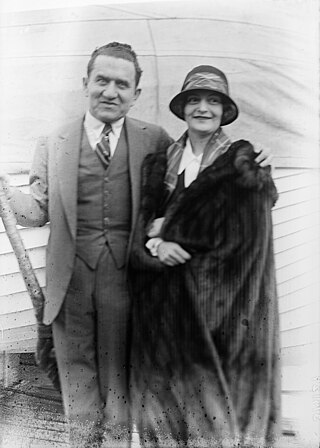Plot
This article needs a plot summary.(March 2023) |
Pierre of the Plains is a 1914 film based on the novel Pierre and his People by Gilbert Parker. [1] Edgar Selwyn adapted the novel into the play Pierre of the Plains in 1908 and it made Elsie Ferguson a Broadway star. [2]
Benjamin S. Kutler wrote the scenario. The film stars Selwyn himself, The supporting cast features Dorothy Dalton, Sydney Seaward, and Lawrence B. McGill.
This article needs a plot summary.(March 2023) |
Elsie Ferguson herself appeared in Paramount's version in 1918 under the title Heart of the Wilds , directed by Marshall Neilan. The play was filmed in 1942, again titled Pierre of the Plains .
The year 1919 in film involved some significant events.

Elsie Louise Ferguson was an American stage and film actress. Seen by some as an early feminist, she promoted suffrage, which she discussed in interviews, and supported animal rights.

Frederick Tyrone Edmond Power Sr. was an English-born American stage and screen actor, known professionally as Tyrone Power. He is now usually referred to as Tyrone Power Sr. to differentiate him from his son, actor Tyrone Power.
Outcast or Outcasts may refer to:

Dorothy Dalton was an American silent film actress and stage personality who worked her way from a stock company to a movie career. Beginning in 1910, Dalton was a player in stock companies in Chicago; Terre Haute, Indiana; and Holyoke, Massachusetts. She joined the Keith-Albee-Orpheum Corporation vaudeville circuits. By 1914 she was working in Hollywood.

Forever is a 1921 American silent romance film, also known as Peter Ibbetson, that was written by Ouida Bergère and directed by George Fitzmaurice. It was adapted from George du Maurier's 1891 novel Peter Ibbetson, which was made into a play of the same name by John N. Raphael.

The Arab is a 1915 American silent adventure film directed by Cecil B. DeMille. Edgar Selwyn wrote and starred in the Broadway play version of the story in 1911, and this film is based on that play. Selwyn reprises his role from his play. This film was refilmed by Metro Pictures in 1924 as The Arab. The film is now lost.

Edgar Selwyn was a prominent figure in American theatre and film in the first half of the 20th century. An actor, playwright, director and producer on Broadway, he founded a theatrical production company with his brother, Archibald Selwyn, and owned a number of Selwyn Theatres in the United States. He transferred his talents from the stage to motion pictures, and directed a film for which Helen Hayes received the Academy Award for Best Actress. Selwyn co-founded Goldwyn Pictures in 1916.

The Song of Songs is a 1933 American pre-Code romantic drama film directed by Rouben Mamoulian, starring Marlene Dietrich as a naive German peasant named Lily who moves to Berlin and suffers a considerable amount of heartache. This particular version of the film was based on the 1908 novel The Song of Songs by Hermann Sudermann. The novel's original title, which translates to English as "The High Song", does indeed refer to the Song of Solomon, which is often described in German as "Das Hohe Lied der Liebe". However, that is not the only possible inference. "HoheLied" has been translated as "ode" "hosannas" "praises" and used in purely secular as well as religious contexts. Most telling in this case is the use in German of the entire phrase to describe the "great song of love" or "ode to love" in Paul's First Epistle to the Corinthians. This creates a double layer of meaning to the title of the novel in German, one that could not be duplicated in an English rendition.

The Witness for the Defense is a 1919 American silent drama film directed by George Fitzmaurice and starring Elsie Ferguson, Warner Oland, and Wyndham Standing.

A Society Exile (1919) is an American silent film drama directed by George Fitzmaurice and starring Elsie Ferguson, Julia Dean, and William Carleton. The assistant director to Fitzmaurice was William Scully. The film marks the second screen appearance of the actor Henry Stephenson. The film was based upon the play We Can't Be as Bad as All That by Henry Arthur Jones.

Under the Greenwood Tree is a 1918 American silent drama film directed by Emile Chautard and starring Elsie Ferguson. The movie was based on a play by Henry V. Esmond. An unrelated British film with this title based on the Thomas Hardy novel Under the Greenwood Tree was made in 1929. The film possibly has a scene where Ferguson swims in the nude in a pond. The title refers to a line in William Shakespeare's play As You Like It. It is classified as being a lost film.

Lady Rose's Daughter is a 1920 American silent drama film starring Elsie Ferguson and David Powell with directing being from Hugh Ford. It was produced by Famous Players-Lasky and released through Paramount Pictures. The film was based on a stage play performed in 1903 on Broadway. Both the film and the play were based on the famous 1903 novel by Mrs. Humphry Ward. The actress Ida Waterman had appeared in the original 1903 Broadway play.

Dancing Mothers is a 1926 American black and white silent drama film produced by Paramount Pictures. The film was directed by Herbert Brenon, and stars Alice Joyce, Conway Tearle, and making her debut appearance for a Paramount Pictures film, Clara Bow. Dancing Mothers was released to the general public on March 1, 1926. The film tells the story of a pretty mother, who was almost cheated out of life by a heartless husband and a thoughtless daughter. The film survives on 16mm film stock and is currently kept at the UCLA Film and Television Archive.

Scarlet Pages is a 1930 pre-Code American crime drama film with songs starring Elsie Ferguson and directed by Ray Enright. It was produced and distributed by First National Pictures, a subsidiary of Warner Bros. The film stars Elsie Ferguson, John Halliday, Grant Withers and Marian Nixon. Scarlet Pages is based on a 1929 Broadway play of the same name that Ferguson also starred in. It is similar in theme to the better remembered Five Star Final, also by Warners released a year later. The film simultaneously marked the first time Ferguson appeared in a sound film and the last film she ever made.

The Song of Songs is a 1918 American silent drama film produced by Famous Players-Lasky and based on a 1914 stage play version by Edward Sheldon of the 1908 novel by Hermann Sudermann, The Song of Songs. This picture was directed by Joseph Kaufman and stars Elsie Ferguson. This was Kaufman's last film before his death on February 1, 1918, very early on during the 1918 flu pandemic.

Eve's Secret is a 1925 American silent romantic comedy film produced by Famous Players-Lasky and released by Paramount Pictures. It is based on a Broadway play, Moon-Flower, by Zoë Akins, adapted from a Hungarian play by Lajos Bíró. On Broadway Elsie Ferguson starred. Clarence Badger directed Betty Compson and Jack Holt.
Pierre of the Plains is a 1942 Northern film set in Saskatchewan, Canada, directed by George B. Seitz and starring John Carroll and Ruth Hussey. The supporting cast features Bruce Cabot, Reginald Owen, Henry Travers, Evelyn Ankers and Sheldon Leonard. The movie is a remake of a 1914 version co-written by and starring Edgar Selwyn.

Heart of the Wilds is a lost 1918 American silent drama film directed by Marshall Neilan and starring Elsie Ferguson. The story is from "Pierre and His People", by Gilbert Parker, which Edgar Selwyn also based his play Pierre of the Plains on. Ferguson had become a star in 1908 in Selwyn's Broadway play.

Archibald Selwyn was an American play broker, theater owner and stage producer who had many Broadway successes. He and his brother Edgar Selwyn were partners. They were among the founders of Goldwyn Pictures, later to be merged into MGM.